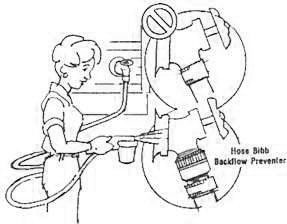 What is a cross connection? It's an actual or potential connection between a potable water line and any waste pipe, soil pipe, sewer, drain or other unapproved source. These connections pose a threat to public health by allowing contaminants to be siphoned or forced into the public drinking water system under certain hydraulic conditions.
What is a cross connection? It's an actual or potential connection between a potable water line and any waste pipe, soil pipe, sewer, drain or other unapproved source. These connections pose a threat to public health by allowing contaminants to be siphoned or forced into the public drinking water system under certain hydraulic conditions.
In a residential setting, cross connections include submerged hoses, lawn irrigation systems, chemical spray applicators, connections to private wells, boilers, solar heating systems and fire sprinkler systems. These connections, if left unprotected, could introduce contaminants to the water system. Consumers play an important role in protecting public health by notifying the Water Department of any cross connections and helping to eliminate or properly protect the connection by installing a backflow prevention device.